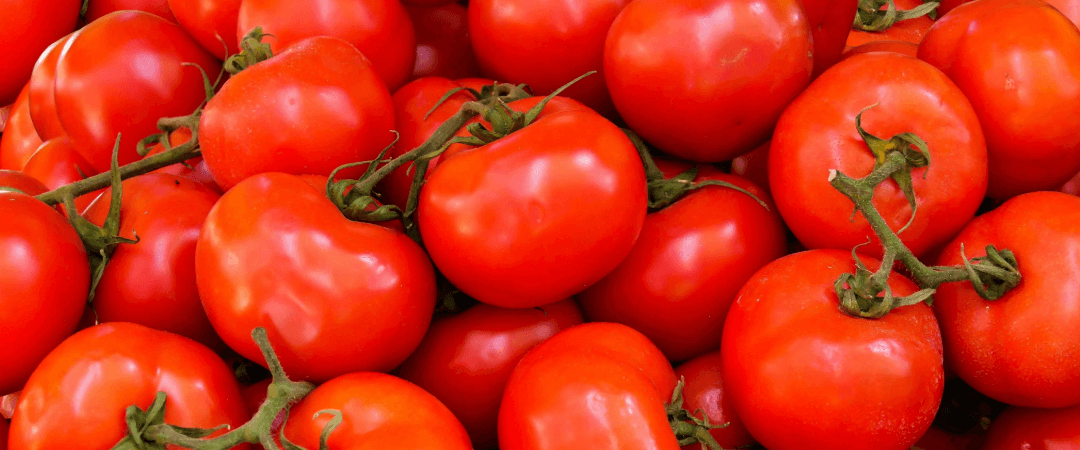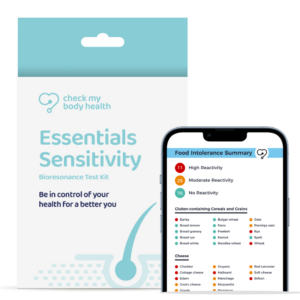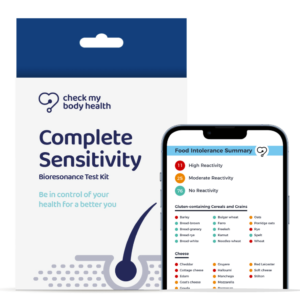
Medically reviewed by Sian Baker, Dip ION mBANT mCNHC
on April 2, 2024. To give you technically accurate, evidence-based information, content published on the Check My Body Health blog is reviewed by credentialed professionals with expertise in medical and bioscience fields.
Does a plate of spaghetti marinara or a spicy veggie curry leave you feeling bloated, achy, or just plain off? While you might chalk it up to a sensitive stomach, the culprit could be a surprising group of vegetables – nightshades. Nightshade intolerance is the term used when someone experiences unpleasant symptoms after consuming these foods. But is it merely a trendy concern, or could those tomatoes and peppers be causing more trouble than you realise?
What are Nightshade Vegetables?
You might be surprised by the vast range of everyday foods that belong to the nightshade family, known botanically as Solanaceae. Far from the poisonous nightshades of myth, these plants include some incredibly popular vegetables and fruits.
Here’s a table of edible nightshade plants:
| Common Name | Other Names | Notes |
| Tomatoes | All varieties, including cherry, heirloom, Roma, and in sauces or pastes. | |
| Potatoes | White potatoes, red potatoes, russets | Does NOT include sweet potatoes or yams. |
| Eggplant | Aubergine | Includes all shapes, sizes, and colours. |
| Peppers | Bell peppers, chilli peppers, hot peppers | Extends to spices like paprika, cayenne, red pepper flakes. |
| Tomatillos | The green, slightly tart fruit used in Mexican cuisine. | |
| Goji Berries | Wolfberries | Often found dried. |
| Ashwagandha | An herb used in traditional medicine. | |
| Pepino Melons | A sweet, juicy fruit with a melon-like flavour. | |
| Ground Cherries | Small, yellow fruits with a sweet-tart flavour, often made into jams. | |
| Tamarillos | Tree tomatoes | |
| Naranjilla | Lulo | A citrus fruit common in South America. |
| Tobacco | While not consumed as food, it’s botanically a nightshade. |
The Solanine Factor
Nightshades contain a natural compound called solanine, which helps protect the plant. The highest concentrations are found in the leaves and stems, which we usually don’t eat. However, some solanine is present in the edible parts, and that’s where potential sensitivity issues arise.
Let’s look into how nightshades might cause digestive distress and inflammation.
Understanding Nightshade Intolerance
For most people, nightshade vegetables are nutritious additions to their diet. However, some individuals struggle to fully digest the compounds in these foods. This incomplete digestion can set off a series of reactions within your gut, leading to inflammation and a host of uncomfortable symptoms.
- The Gut Connection: When certain components of nightshades aren’t broken down properly, they can irritate the lining of your intestines. This irritation can lead to increased gut permeability, often referred to as “leaky gut”. Increased gut permeability allows undigested food particles and other substances to enter into your bloodstream, triggering an inflammatory immune response.
- Common Symptoms of Nightshade Intolerance: The symptoms of intolerance can range from mild to severe and can manifest in various ways:
- Digestive Issues: Bloating, gas, abdominal pain, diarrhoea, or constipation.
- Joint Pain & Stiffness: Flare-ups of joint pain or stiffness, mimicking arthritis-like symptoms.
- Skin Problems: Rashes, eczema flare-ups, unexplained itching or hives.
- Fatigue & Brain fog: Unexplained tiredness or difficulty concentrating.
- The Autoimmune Connection: Some theories suggest that for those with autoimmune conditions (like rheumatoid arthritis or inflammatory bowel disease), nightshades may exacerbate existing inflammation. However, more research is needed to fully understand this potential link. It’s important to remember that nightshade intolerance is about a digestive reaction, not directly triggering an autoimmune condition.
Who is at Risk?
It’s important to understand that anyone can develop a nightshade intolerance, regardless of age or overall health. However, some factors might make certain individuals more susceptible:
- Individuals with Existing Gut Issues: If you already have conditions like Irritable Bowel Syndrome (IBS) or IBD, leaky gut, or food sensitivities in general, you may have a higher likelihood of being sensitive to nightshades.
- People with Autoimmune Conditions: While the connection isn’t fully established, those with autoimmune conditions might experience worsened symptoms after consuming nightshades. This is thought to be due to the potential for increased inflammation.
- A Family History of Nightshade Intolerance: Although not a guarantee, if close relatives struggle with nightshade-related symptoms, you might share a similar predisposition.
Key Takeaway: It’s truly about your individual response. Regardless of risk factors, the best way to determine whether nightshades are problematic is by listening to your body and exploring potential links with guidance.
How to Identify Nightshade Intolerance
If you suspect nightshades are causing you discomfort, there are several ways to get to the bottom of it. Here’s a breakdown of the most common approaches:
- The Elimination Diet: This involves completely removing all nightshades from your diet for several weeks (typically 2-4 weeks). If your symptoms improve significantly, it’s a strong indication of intolerance. You would then reintroduce nightshades one at a time, monitoring your reactions closely to pinpoint specific culprits. It’s best to do this under the guidance of a healthcare professional.
- Food & Symptom Journal: Becoming a food detective is crucial! Track everything you eat, noting portions and any ingredients that contain nightshades. Simultaneously, record any symptoms you experience, including their severity and timing. Look for patterns that connect nightshade consumption with flare-ups of bloating, joint pain, or other issues.
- Food Intolerance Testing: Specialised tests can analyse your blood for immune reactions to various foods, including nightshades. These can offer valuable clues about potential sensitivities, helping streamline your dietary changes.
- Seeking Professional Help: A doctor, registered dietitian, or nutritionist experienced in food intolerances can guide you through the elimination process, interpret test results, and develop a personalised plan to manage any discovered sensitivities.
Living with Nightshade Intolerance
Discovering a nightshade intolerance doesn’t mean a life of deprivation. With some adjustments and a focus on delicious alternatives, you can still enjoy a flavorful and nourishing diet.
- Delicious Alternatives Abound: Don’t despair! For every nightshade, there are fantastic substitutes. Swap potatoes for sweet potatoes or parsnips, try a cauliflower-based pizza crust, experiment with colourful root vegetables, and use an array of herbs and spices to add flavour dimensions.
- Read Labels Diligently: Nightshades can lurk in unexpected places. Check the ingredients lists of sauces, pre-prepared foods, spice mixes, and even some supplements. Be on the lookout for things like tomato paste, potato starch, and of course, any pepper variations.
- Focus on Whole Foods: Building your diet around whole, unprocessed foods is key for overall gut health and makes navigating intolerances easier. Cook from scratch as much as possible, prioritising fresh vegetables, fruits, lean proteins, and healthy fats.
- Don’t Forget Your Nutrients: If your nightshade restriction is significant, work with a dietitian. They can ensure you’re still getting the nutrients typically provided by these foods from other sources.
Living with nightshade intolerance is about being informed and proactive, not restrictive.
Uncover Your Nightshade Sensitivity – Take Back Control
Nightshade intolerance is a real issue for many individuals, even if it’s often underdiagnosed or dismissed. Understanding the potential connection between these foods and your lingering symptoms is the first step toward finding relief and improving your overall well-being.
Remember, everyone’s experience is unique. Listen to your body, track your reactions, and be proactive about investigating your individual sensitivities. If nightshade vegetables are constantly leaving you feeling unwell, it’s time to explore solutions.
Don’t let uncertainty about food sensitivities rule your life. Check My Body Health’s comprehensive food intolerance tests can give you a clearer picture of your triggers, including nightshades.




